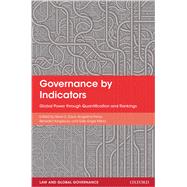
Note: Supplemental materials are not guaranteed with Rental or Used book purchases.
Purchase Benefits
Looking to rent a book? Rent Governance by Indicators Global Power through Classification and Rankings [ISBN: 9780199658244] for the semester, quarter, and short term or search our site for other textbooks by Davis, Kevin; Fisher, Angelina; Kingsbury, Benedict; Engle Merry, Sally. Renting a textbook can save you up to 90% from the cost of buying.
| Abbreviations | p. viii |
| List of Contributors | p. xii |
| Indicators as Technologies of Knowledge Production and Global Governance: Key Concepts and Approaches | |
| Introduction: Global Governance by Indicators | p. 3 |
| Beyond Supply and Demand: A Political-Economic Conceptual Model | p. 29 |
| Taming and Framing Indicators: A Legal Reconstruction of the OECD's Programme for International Student Assessment (PISA) | p. 52 |
| The Dynamism of Indicators | p. 86 |
| Semiotics of Indicators: The Case of Corporate Human Rights Responsibility | p. 110 |
| Governmentalizing Sovereignty: Indexes of State Fragility and the Calculability of Political Order | p. 132 |
| Indicators, Power, and Authority in Global Governance | |
| Re-construction of Private Indicators for Public Purposes | p. 165 |
| Legal Yardsticks: International Financial Institutions as Diagnosticians and Designers of the Laws of Nations | p. 180 |
| From Diagnosing Under-immunization to Evaluating Health Care Systems: Immunization Coverage Indicators as a Technology of Global Governance | p. 217 |
| Translation, Transplantation, and Adaptation: The Relationship Between "Global" and "Local" in Indicator Production and Use | |
| Internally Displaced Population in Colombia: A Case Study on the Domestic Aspects of Indicators as Technologies of Global Governance | p. 249 |
| Problems of Power in the Design of Indicators of Safety and Justice in the Global South | p. 281 |
| Case Studies: Assessing the Strengths, Problems, and Effects of Indicators in Human Rights, Humanitarian Assistance, and Social Investment | |
| Measuring Human Rights: UN Indicators in Critical Perspective | p. 297 |
| The Use of Indicators to Measure Government Responses to Human Trafficking | p. 317 |
| Fighting Human Trafficking of Instituting Authoritarian Control? The Political Co-optation of Human Rights Protection in Belarus | p. 344 |
| Rights-based Humanitarian Indicators in Post-earthquake Haiti | p. 365 |
| Impact Investment Indicators: A Critical Assessment | p. 392 |
| Regulating Indicators | |
| Accountability in the Generation of Governance Indicators | p. 437 |
| Public Regulation of Global Indicators | p. 465 |
| Index | p. 475 |
| Table of Contents provided by Ingram. All Rights Reserved. |
The New copy of this book will include any supplemental materials advertised. Please check the title of the book to determine if it should include any access cards, study guides, lab manuals, CDs, etc.
The Used, Rental and eBook copies of this book are not guaranteed to include any supplemental materials. Typically, only the book itself is included. This is true even if the title states it includes any access cards, study guides, lab manuals, CDs, etc.